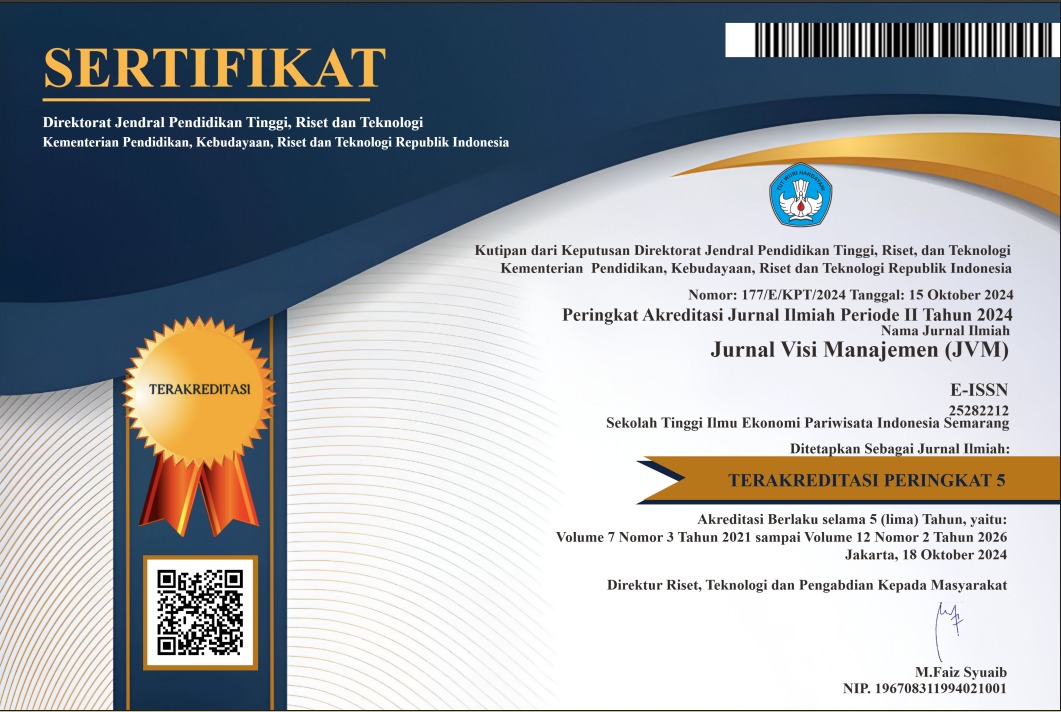Pengaruh Perilaku Wisatawan terhadap Minat Berkunjung ke Wisata Sejarah di Kota Bandung
Studi Kasus Gen Z Kota Bandung
DOI:
https://doi.org/10.56910/jvm.v11i3.752Keywords:
Gen Z, Historical Tourism, SEM-PLS, Tourist Behavior, Visit IntentionAbstract
This study aims to examine the influence of tourist behavior on interest in visiting historical tourist destinations in Bandung, with a focus on Generation Z as a growing potential tourist segment. Tourist behavior in this context is analyzed through four main factors, namely cultural, social, personal, and psychological factors that theoretically can influence tourist decisions in choosing a destination. This study uses a quantitative approach with a descriptive-verification method, where primary data is obtained by distributing questionnaires to respondents included in the Generation Z category and who have or have the potential to visit historical tourist destinations in Bandung. The data analysis technique used is Partial Least Square (PLS), because it is able to test the relationship between variables simultaneously and partially. The results show that tourist behavior simultaneously has a significant effect on interest in visiting historical tourist destinations. However, partial analysis shows that not all factors contribute equally. Social, personal, and psychological factors are proven to have a significant influence on the interest in visiting Generation Z. This indicates that social interaction, lifestyle, individual characteristics, and motivation and psychological needs are more dominant in encouraging Generation Z to choose historical tourism as a destination. On the other hand, cultural factors do not show a significant influence, indicating that cultural background is not a major consideration in Generation Z's travel decisions. This finding provides practical implications for managers of historical tourism destinations in Bandung City, namely the need to develop promotional strategies and service development that emphasize social aspects, personalization of experiences, and fulfillment of the psychological needs of Generation Z. Thus, the appeal of historical tourism can be improved and be more relevant to the preferences of the younger generation.
References
Aqil, I. (2023). Pengaruh electronic word of mouth, destination image dan tourist attitude terhadap revisit intention Taman Wisata Geopark Silokek Sijunjung [Skripsi, Universitas Andalas]. Scholar Unand. https://scholar.unand.ac.id
Badan Pusat Statistik. (2024). Jumlah perjalanan wisatawan nusantara menurut provinsi asal (perjalanan), 2023. https://www.bps.go.id/id/statistics-table/2/MTE4OSMy/jumlah-perjalanan-wisatawan-nusantara-menurut-provinsi-asal.html
Bonita, M. S., Susanto, E., & Sutaji, D. S. (2022). Penerapan technology acceptance model pada rancangan buku elektronik panduan perjalanan wisata sejarah Kota Bandung. Jurnal IPTA, 10(1), 161–172. https://doi.org/10.24843/IPTA.2022.v10.i01.p18
Dinas Kebudayaan dan Pariwisata Kota Bandung. (2023). Jumlah objek wisata berdasarkan kategori di Kota Bandung. Open Data Jabar. https://opendata.bandung.go.id/dataset/jumlah-objek-wisata-berdasarkan-kategori-di-kota-bandung
Fairuuz, N., Nofrian, F., & Desmintari, D. (2022). Peranan jumlah wisatawan asing, nilai tukar, dan PMDN dalam sektor pariwisata terhadap pendapatan devisa pariwisata Indonesia. Jurnal Indonesia Sosial Sains, 3(4), 694–707. https://doi.org/10.36418/jiss.v3i4.570
Hariyani, E. (2023). Pengaruh destination image dan aksesibilitas wisata terhadap revisit intention dalam perspektif ekonomi Islam (Studi pada pengunjung wisata Curup Kereta Desa Rambang Jaya, Kec. Umpu Semenguk, Kab. Way Kanan) [Skripsi, Universitas Lampung].
Janna, N. M. (2021). Artikel statistik yang benar. Jurnal Darul Dakwah Wal-Irsyad (DDI), (18210047), 1–12.
Kristiutami, Y. P., Dewi, D. P., & Syarifuddin, D. (2020). Pengaruh pengalaman museum experience terhadap kepuasan pengunjung di Museum Sri Baduga. Jurnal Nusantara (Jurnal Ilmiah Pariwisata dan Perhotelan), 3(2), 1–12. https://doi.org/10.31219/osf.io/svu73
Kurniawan, K., Suganda, D., & Khadijah, U. L. S. (2023). Konstruksi sketsa wisata heritage dalam menarik minat berkunjung wisatawan (Studi kasus di Bandung Sketchwalk). ANDHARUPA: Jurnal Desain Komunikasi Visual & Multimedia, 9(2), 144–165. https://doi.org/10.33633/andharupa.v9i02.7270
Makbul, M. (2021). Metode pengumpulan data dan instrumen penelitian. OSF Preprints. https://doi.org/10.31219/osf.io/svu73
Marlina, L., & Hidayati, N. (2023). Peran pariwisata berbasis industri dalam pengembangan bisnis di Indonesia. Jurnal Riset Multidisiplin dan Inovasi Teknologi, 1(1), 31–40. https://doi.org/10.59653/jimat.v1i01.163
Nengsih, R., Ghani, Y. A., & Mubarok, A. (2023). Pengaruh word of mouth dan kualitas pelayanan terhadap minat berkunjung kembali. Service Management Triangle: Jurnal Manajemen Jasa, 5(1), 32–38. https://doi.org/10.51977/jsj.v5i1.1222
Pomantow, C., Langi, F. M., & Waworuntu, C. N. (2022). Analisis perilaku wisatawan dalam memilih objek wisata di Kota Manado. Humanlight Journal of Psychology, 3(2), 102–113.
Prasetyo, H. (2024). Pengaruh faktor-faktor yang mempengaruhi minat berkunjung ke obyek wisata Puncak Pinus Becici Bantul Yogyakarta. Journal of Community Based Tourism, 8(1), 155–169. https://doi.org/10.47200/jcob.v8i01.2525
Simanungkalit, R. E. (2022). Peran Gen Z dalam pengembangan wisata berbasis sejarah. Seminar Nasional 2022-NBM Arts, 1–7.
Surveyandini, M., & Achadi, A. (2021). Pengaruh penerapan total quality management terhadap kinerja karyawan pada Lembaga Kursus dan Pelatihan American English Course Purwokerto. Sebatik, 25(1), 241–247. https://doi.org/10.46984/sebatik.v25i1.1214
Downloads
Published
How to Cite
Issue
Section
License
Copyright (c) 2025 Jurnal Visi Manajemen

This work is licensed under a Creative Commons Attribution-ShareAlike 4.0 International License.







